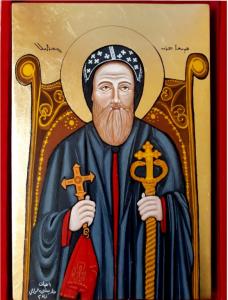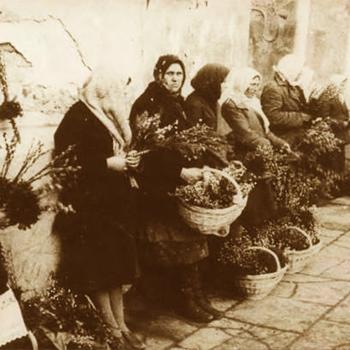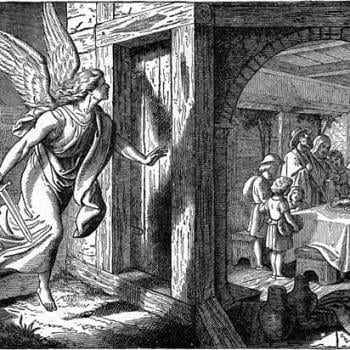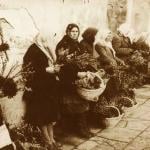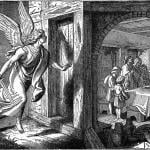Some Apocryphal Psalms in Syriac
William Wright
I was rummaging around looking for something else when I stumbled upon the small factoid that the Syriac Orthodox Church has, depending on how you count it, four or five Psalms in addition to the generally understood list of 150 collected in the Jewish tradition as well as in Protestant and Catholic churches. The Orthodox churches add in a 151st. But, the additional five, well, that was some kind of treat. The Syriac church is part of the larger family gathered as “Oriental Orthodox,” in distinction from the Eastern Orthodox that we are generally more familiar with.
Digging into the matter a bit further, I found this mini article with the texts translated, published as “Some Apocryphal Psalms in Syriac,” in the “Proceedings of the Society of Biblical Archaeology,” vol. 9 (1886-7) pp.257-258, 264-6.
The author and translator was William Wright, Fellow of Queens’ College, Cambridge, a professor of Arabic at the University College, London, as well as at Trinity College, Dublin. He was also an assistant Keeper of Manuscripts at the British Museum, among other honors and appointments.
JIF
Professor Wright informs us:
In a Syriac MS., formerly belonging to the Society for Promoting Christian Knowledge, but now deposited in the University Library of Cambridge, I find the following apocryphal Psalms, which, with the exception of the first, have not yet, so far as I know, been printed anywhere. The MS. contains the Kethabha dhe-Dhurrasha, or ‘Book of Discipline,’ a large theological treatise, composed on a very artificial plan, by Elias, bishop of Peroz-Shabhor or al-Anbar (who lived about a.d. 920; see Assemani, B.O. iii. 1, p. 258 sq.). At the end of the first section of this work, the scribe has added a few excerpts for the purpose of filling up some blank leaves. These are: (1) the Psalms in question, ff. 115a-116b; (2) explanations of some difficult words in ‘the Book of the Paradise’; and (3) a disputation between a Jacobite and a Nestorian, ff. 116b-117b. The scribe was the well known Homo of Al-Kosh, near Mosul, “the village of the prophet Nahum.” He has recorded his name in several subscriptions, but as the MS. is imperfect at the end, the exact date of writing is not given. It must, however, roughly speaking, lie between a.d. 1675 and 1712 (see Hoffmann, Opusc. Nestor., pp. Ill, IV), and the watermark in the paper—-three crescents with a rather small adjunct of this shape [*] in one corner of the page—-would seem to belong to the latter part of the xviith century.
These same Psalms, five in number, are also found, with the same adjuncts, in the Vatican MS. of Elias of al-Anbar’s work, Cod. Vat. Syr. clxxxiii, ff. 117b-119a (see Assemani’s Catalogue, t. iii, p. 385). Professor Guidi has, with his usual kindness, collated this MS. for me. It is dated A. Gr. 2014 = a.d. 1703, and was written at Al-Kosh by one Khaushabha bar Daniel. |258
The Psalms are five in number, of which the first is that ordinarily numbered as Ps. cli in Greek and Syriac Hexaplar MSS. (see, for example, the Codex Ambrosianus, ed. Ceriani, f. 38b). I reproduce the text, so far as possible, exactly as it stands in the MSS. |264
Five Psalms of David, which are not written in the order of the psalms.
I. Ps. cli. A Thanksgiving of David.
(1) I was the youngest among my brethren, and a youth in my father’s house. (2) I used to feed my father’s flock, and I found a lion and a wolf, and slew them and rent them. (3) My hands made an organ, and my fingers fashioned a harp. (4) Who will show me my Lord? He, my Lord, is become my God.1 (5) He sent His angel and took me away from my father’s flock, and anointed me with the oil of anointing. (6) My brethren, the fair and the tall, in them the Lord had no pleasure. (7) And I went forth to meet the Philistine, and he cursed me by his idols. (8) But I drew his sword and cut off his head, and took away the reproach from the children of Israel.
II. The Prayer of Hezekiah when enemies surrounded him.
(1) With a loud voice glorify ye God; in the assembly of many proclaim ye His glory. (2) Amid the multitude of the upright glorify His praise; and speak of His glory with the righteous. (3) Join yourselves (literally, your soul) to the good and to the perfect, to glorify the Most High. (4) Gather yourselves together to make known His strength; and be not slow in showing forth His deliverance [and His strength] and His glory to all babes. (5) That the honour of the Lord may be known, wisdom hath been given; and to tell of His works it hath been made known to men: (6) to make known unto babes His strength, and to make them that lack understanding (literally, heart) to comprehend His glory; (7) who are far from His entrances and distant from His gates: (8) because the Lord of Jacob is exalted, and His glory is upon all His works. (9) And a man who glorifies the Most High, in him will He take pleasure; as in one who offers fine meal, and as in one who offers he-goats and calves; (10) and as in one who makes fat the altar with a multitude of burnt offerings; and as the smell of incense from the hands of the just. (11) From thy upright gates 2 shall be heard His voice, and from the voice of the upright admonition. (12) And |265 in their eating shall be satisfying in truth, and in their drinking, when they share together. (13) Their dwelling is in the law of the Most High, and their speech is to make known His strength. (14) How far from the wicked is speech of Him, and from all transgressors to know Him! (15) Lo, the eye of the Lord taketh pity on the good, and unto them that glorify Him will He multiply mercy, and from the time of evil will He deliver their soul. (16) Blessed be the Lord, who hath delivered the wretched from the hand of the wicked; who raiseth up a horn out of Jacob and a judge of the nations out of Israel; (17) that He may prolong His dwelling in Zion, and may adorn our age in Jerusalem.
III. When the People obtained permission from Cyrus to return home.
(1) O Lord, I have cried unto Thee; hearken Thou unto me. (2) I have lifted up my hands to Thy holy dwelling-place; incline Thine ear unto me. (3) And grant me my request;3 my prayer withhold not from me. (4) Build up my soul, and destroy it not; and lay it not bare before the wicked. (5) Them that recompense evil things turn Thou away from me, O judge of truth. (6) O Lord, judge me not according to my sins, because no flesh is innocent before Thee. (7) Make plain to me, O Lord, Thy law, and teach me Thy judgments; (8) and many shall hear of Thy works, and the nations shall praise Thine honour. (9) Remember me and forget me not; and lead me not into things that be too hard for me. (10) The sins of my youth make Thou to pass from me, and my chastisement let them not remember against me. (11) Cleanse me, O Lord, from the evil leprosy, and let it no more come unto me. (12) Dry up its roots in (literally, from) me, and let not its leaves sprout within me. (13) Great art Thou, O Lord; therefore my request shall be fulfilled from before Thee. (14) To whom shall I complain that he may give unto me? and what can the strength of men add [unto me]? (15) From before Thee, O Lord, is my confidence; I cried unto the Lord and He heard me, and healed the breaking of my heart. (16) I slumbered and slept; I dreamed and was helped, and the Lord sustained me. (17) They sorely pained my heart; I will return thanks because the Lord delivered |266 me. (18) Now will I rejoice in their shame; I have hoped in Thee, and I shall not be ashamed. (19) Give Thou honour for ever, even for ever and ever. (20) Deliver Israel Thine elect, and them of the house of Jacob Thy proved one.
IV. Spoken by David when he was contending with the lion and the wolf which took a sheep from his flock.
(1) O God, O God, come to my aid; help Thou me and save me; deliver Thou my soul from the slayer. (2) Shall I go down to Sheol by the mouth of the lion? or shall the wolf confound me? (3) Was it not enough for them that they lay in wait for my father’s flock, and rent in pieces a sheep of my father’s drove, but they were wishing also to destroy my soul? (4) Have pity, O Lord, and save Thy holy one from destruction; that he may rehearse Thy glories in all his times, and may praise Thy great name: (5) when Thou hast delivered him from the hands of the destroying lion and of the ravening wolf, and when Thou hast rescued my captivity from the hands of the wild beasts. (6) Quickly, O my Lord (Adonai), send from before Thee a deliverer, and draw me out of the gaping pit, which imprisons me in its depths.
V. Spoken by David when returning thanks to God, who had delivered him from the lion and the wolf and he had slain both of them.
(1) Praise the Lord, all ye nations; glorify Him, and bless His name: (2) Who rescued the soul of His elect from the hands of death, and delivered His holy one from destruction: (3) and saved me from the nets of Sheol, and my soul from the pit that cannot be fathomed. (4) Because, ere my deliverance could go forth from before Him, I was well nigh rent in two pieces by two wild beasts. (5) But He sent His angel, and shut up from me the gaping mouths, and rescued my life from destruction. (6) My soul shall glorify Him and exalt Him, because of all His kindnesses which He hath done and will do unto me.
Queens’ College, Cambridge,
4th May, 1887.
[Most footnotes and all Syriac material omitted]
1. * Or better, as in Cod. Ambros., The Lord, He is my God.
2. + The feminine suffix seems to be addressed to the city of Jerusalem.
3. * Cod. Vat. my requests.
And at no extra charge, the Lord’s Prayer as sung in the Syriac Orthodox Church…


